Tribun
Author: Karl-Heinz Schmiel
Publisher: Heidelberger Verlag / Fantasy Flight Games
Year: 2007
review by

| x |
|
|
|
|
|
|
|
|
|
|
|
|
|
|
|
|
|
|
|
|
|
|
|
|
|
|
|
|
|
|
|
|
|
|
|
|
|
|
|
|
|
|
|
|
|
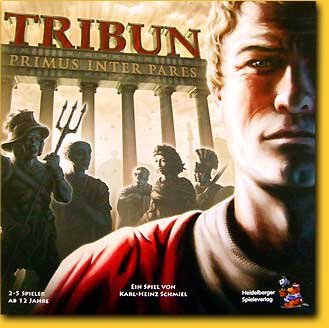 |
As patricians in Rome we strive for influence and power and thus we stroll the various quarters of the city in order to upkeep our valuable contacts or to assert our influence. Thereafter we visit various important factions of the city to exchange these for power, money, influence or glory, in fact anything we can get our hands on. The categories the players try to outwit each other are the |
|
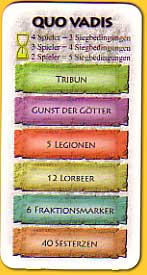 |
| tribune, favour of the gods, legions, wreaths, factions, and money. When a player has met a certain amount of these categories that vary depending on the amount of participating players, he has won. |
| Because ancient Rome except for some larger buildings such as the Pantheon is in ruins, a 2000 year old, but contemporan at that time, city plan has been drawn on the mapboard with as an aside in the rules that this is not a historically correct map, but with our pawns before us we did not expect anything else than an abstract handling of the subject. Further the players start with some money and four faction cards - there are seven different factions in the game - possibly and hopefully two of these cards are of the same faction, as this is the minimum requirement to take over a faction at the end of a round - more of that later. |
| x |
|
|
|
|
|
|
|
|
|
|
|
|
|
|
|
|
|
|
|
|
|
|
|
|
|
|
|
|
|
|
|
|
|
|
|
|
|
|
|
|
|
|
|
|
|
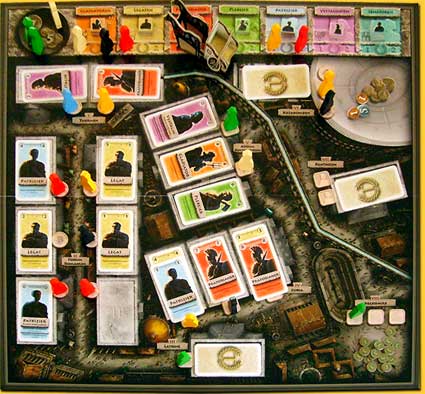 |
|
A round starts by placing the player tokens, one by one, at the various locations on the board; most of them bring a player faction cards. The way cards - or sometimes the wreaths - can be taken changes per location and adds to the attractiveness of the game. This could be for a payment from 1 to 3 sestertii for a single card, or 1 sestertii for 3 cards, whereas for a single wreath two cards of the same faction have to be discarded. Putting a token in the money area gives a player from 7 to 5 sestertii for each token placed there, but also in the latrines it is possible to get money; it is very temptative to make the obvious remark; oh well, the author has put it in front of the goal, so we head it very rightfully in - watch it, here it comes: pecunia non olet! |
| x |
|
|
|
|
|
|
|
|
|
|
|
|
|
|
|
|
|
|
|
|
|
|
|
|
|
|
|
|
|
|
|
|
|
|
|
|
|
|
|
|
|
|
|
|
|
When Rome has been worked according to the number of the locations and each player has filled his hand with faction ‘munition’ cards, the row of the factions is processed. Players who have placed a pawn at any of these locations, indicate that they want to take influence in this faction by taking it over. To take an initially unowned faction over, a player plays two or more of the corresponding faction cards, and that’s it! The cards remain in front of the player to indicate the level of influence.
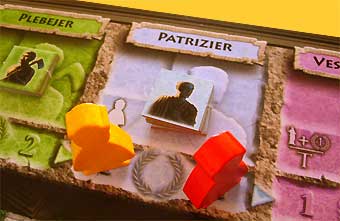 |
|
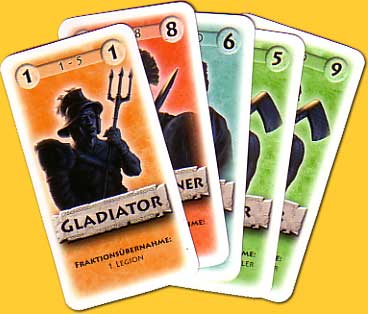 |
| x |
|
|
|
|
|
|
|
|
|
|
|
|
|
|
|
|
|
|
|
|
|
|
|
|
|
|
|
|
|
|
|
|
|
|
|
|
|
|
|
|
|
|
|
|
|
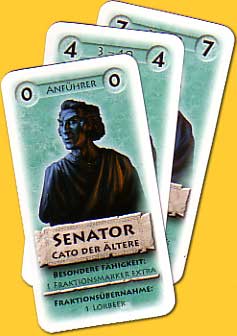 |
When an other player wants to take over this faction in a future turn, he mereley has to either play cards totalling a higher value, or the number of played cards is more than the cards the opposing player has in front of him. Simple, done, nothing to it, no dice throwing whatsoever, although the Romans seem to have been fanatic gamblers, we got that dished up in bible class when we were tought from a large illustrated paper how they gambled for His Cloth under His Cross, oh infamy! We still can see the signs of a dice game scraped into the marmor at the Forum Romanum in Rome. Oh, and now we’re to it; read the terrific ‘Emperors of Rome’ by Suetonius, for some historical information on Roman life and its emperors! |
| x |
|
|
|
|
|
|
|
|
|
|
|
|
|
|
|
|
|
|
|
|
|
|
|
|
|
|
|
|
|
|
|
|
|
|
|
|
|
|
|
|
|
|
|
|
|
| Bonuses are given for take overs (this sounds very familiar and like modern times!), and when a faction head card was involved its bonus is also rewarded. After this the privileges of the factions are worked; each player with influence in a faction gets the accompanying privilege, from an extra token for the next turn or the allowance to buy a legion, to the favour of the gods or the tribune, who is not easy to acquire because it involves additional requirements. |
 |
x |
 |
|
| x |
|
|
|
|
|
|
|
|
|
|
|
|
|
|
|
|
|
|
|
|
|
|
|
|
|
|
|
|
|
|
|
|
|
|
|
|
|
|
|
|
|
|
|
|
|
 |
|
|
|
|
|
|
|
|
|
|
|
|
|
|
|
|
|
|
|
|
|
|
|
|
|
|
|
|
|
|
|
|
|
|
|
|
|
|
|
|
|
| Well, nothing to it! This goes on for a round of four, five, until someone shouts bingo! because he has met the victory conditions, just before the rest of us. This is the only minor part of the game: that it is not always or very obvious what the status of each player is, and how close he is to winning. |
Of course many details did not get enlightened, such as the carriage - a nice gadget - in order to block the take over of a faction, but hey, we are not here to copy the twelve page rulebook, with ample examples and historical information, but what we are here for, is to warn you for an addictive and fun game! ‘Tribun’ is a very entertaining and pleasant ‘card game plus’ that can be played in under an hour. And for the lack of throwing dice, well, there are other games that do the job!
© 2007 Richard van Vugt
|
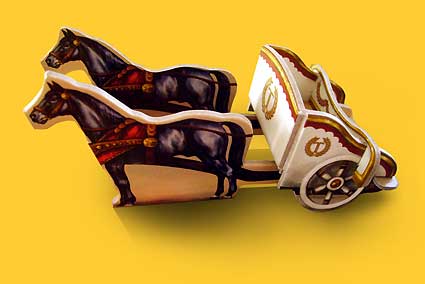 |
Tribun, Karl-Heinz Schmiel, Heidelberger Spieleverlag, 2007 - 2 to 5 players, 12 years and up, 60-90 minutes
|
  |
|
|
|
|
|
|
|
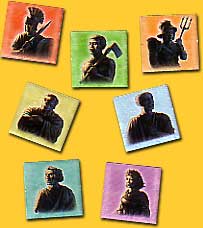 |
  |
|
|
|
|
|
|
|
  |
|
|
|
|
|
|
|
  |
|
|
|
|
|
|
|
  |
|
|
|
|
|
|
|
  |
|
|
|
|
|
|
|
  |
|
|
|
|
|
|
|
  |
|
|
|
|
|
|
|
| x |
|
|
|
|
|
|
|
|
|
|
|
| x |
|
|
|
|
|
|
|
|
|
|
|
 |
|
|
|
|
|
|
|
 |
|
|
|
|
|
|
|
| x |
|
|
|
|
|
|
|
|
|
|
|
 |
|
|
|
|
|
|
|
|
|
|
|
|
|
|
|
|
|
|
|
|
|
|
|
|
|
|
|
|
|
|
|
|
|
 |
|
|
|
|
|
|
|
|
|
|
|
|
|
|
|
|
|
|
|
|
|
|
|
|
|
|
|
|
|
|
|
|
|
|
|